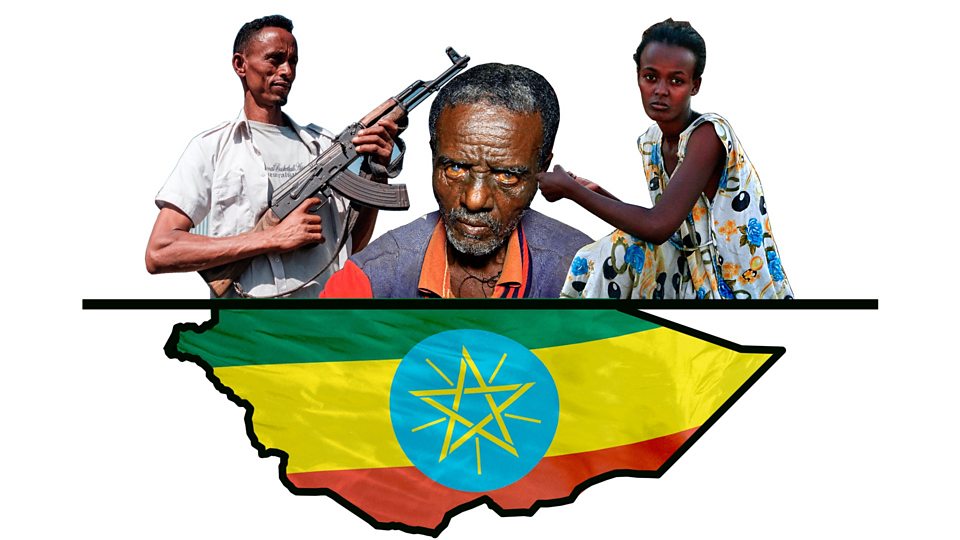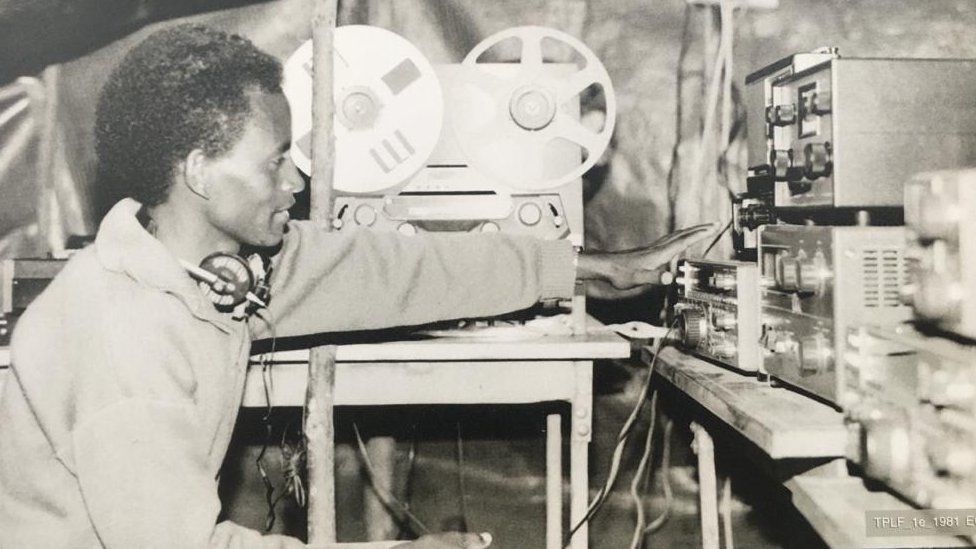22 November 2020 BBC news
The Ethiopian government will not talk with leaders of the northern Tigray region to end the conflict there, an aide to PM Abiy Ahmed has told the BBC.
“We don’t negotiate with criminals… We bring them to justice, not to the negotiating table,” said Mamo Mihretu.
African leaders have urged the government to meet Tigrayan leaders, The conflict has reportedly killed hundreds and displaced thousands in recent weeks. The UN has warned it could trigger a humanitarian crisis.

On Friday, South Africa’s President Cyril Ramaphosa, in his capacity as the African Union Chairperson, announced the appointment of three former presidents to lead talks to end the conflict.
But Ethiopia has rejected the offer, seeing its operation as an internal “law enforcement” mission.
Government forces seized key towns last week and say they are preparing for an assault on Tigray’s capital Mekelle.
The TPLF has vowed to defend the mountainous region. Its fighters, drawn mostly from a paramilitary unit and a well-drilled local militia, are thought to number 250,000.
- Debretsion Gebremichael, the man at the heart of the conflict
- Ethiopia’s Tigray crisis: The long, medium, and short story
- Fact-checking misleading images in Ethiopia conflict
The conflict is rooted in long-standing tension between the Tigray People’s Liberation Front (TPLF), the powerful regional party, and Ethiopia’s central government.
When Mr Abiy postponed a national election because of coronavirus in June, tensions escalated. The TPLF sees the central government as illegitimate, arguing that Mr Abiy no longer has a mandate.
On 4 November the Ethiopian prime minister announced an operation against the TPLF, accusing its forces of attacking the army’s northern command headquarters in Mekelle.
TPLF has rejected the claims.
What else did Abiy’s aide say?
“Our African brothers and sisters would play a more significant role if they put pressure on TPLF to surrender and for that, you know, nobody needs to go to Tigray or Mekelle to make that point clear to them,” Mr Mamo said.
He said that former leaders from Mozambique, Liberia, and South Africa – who are due to arrive in the country in the coming days – would not be able to visit Tigray because of the ongoing military operation.
Communication and transport services has been severely hampered since fighting broke out.
Mr Mamo added that the government was doing its “utmost” to allow UN agencies to provide assistance to people in Tigray.
- Ethiopia’s Tigray crisis: The long, medium, and short story
- Fact-checking misleading images in Ethiopia conflict
The military announced on Sunday that it was planning to seize Mekelle.
“The next phases are the decisive part of the operation, which is to encircle Mekelle using tanks, finishing the battle on mountainous areas and advancing to the fields,” Col Dejene Tsegaye, a military spokesman, told the state-run Ethiopia Broadcasting Corporation.ADVERTISEMENT
“We want to send a message to the public in Mekelle to save themselves from any artillery attacks and free themselves from the junta. After that, there will no mercy,” he added.
But TPLF leader Debretsion Gebremichael told the AFP news agency that his forces “will not stop fighting,” adding that government troops “will continue to pay for every move.”

How bad is the situation?
Aid agencies have no access to the conflict zone, but they fear that thousands of civilians may have been killed since fighting erupted at the beginning of November.
At least 33,000 refugees have already crossed into Sudan. The UN refugee agency has said it is preparing for up to 200,000 people to arrive over the next six months if the fighting continues.
On Friday, the TPLF was accused of firing rockets into the city of Bahir Dar in the neighbouring Amhara region. The Amhara government said there were no casualties and no damage caused.
But the reported incident in Amhara, which has a long-running border dispute with Tigray, has raised concerns that the conflict could extend into a wider war after regional forces were sent to support federal troops.
- Tigray crisis: Why there are fears of civil war in Ethiopia
- Marooned by conflict: ‘My little brother needs medicine’
Meanwhile, the UN has raised concerns about the influx of refugees into Sudan, which it says could destabilise a nation already supporting about a million people displaced from other African countries.

Many of the refugees arriving in Sudan are believed to be children. Aid agencies say an immediate ceasefire would allow them to help thousands of civilians still trapped inside Ethiopia.
A former guerrilla fighter who used to jam the communication network of Ethiopian troops, Debretsion Gebremichael is now leading the fight against Prime Minister Abiy Ahmed’s government for control of the northern Tigray region, described as the “womb” of the nation.
Mr Debretsion leads the Tigray People’s Liberation Front (TPLF), the party which controls Tigray, and which has fallen out so dramatically with Mr Abiy.
Now married with a young child, Mr Debretsion cut short his studies at the University of Addis Ababa in the 1970s to join the TPLF in its 17-year war against Marxist ruler Mengistu Haile Mariam’s Derg regime.
He then went on to be a government minister after the Derg had been defeated and replaced by a coalition of parties dominated by the TPLF until Mr Abiy came to power in 2018.
His close friend and comrade Alemayehu Gezahegn said that after they had both completed their military training in the rugged and mountainous terrain of Tigray and, noting his comrade’s technical skills, he suggested to TPLF commanders that Mr Debretsion should be deployed to the “technical unit”.

For Mr Alemayehu, this was the logical place for Mr Debretsion, as he was a bright, but reserved, “city boy” who grew up in Shire, which, in a major blow to the Tigray leader, is now under the control of federal troops.
‘Made lightbulb from scraps’
Coming from an Orthodox Christian family, the Tigray leader was named Debretsion, which means Mount Zion, while his second name is that of his father, Gebremichael, meaning Servant of Saint Michael.
“When he was in primary school, he used to collect old batteries, radios, electric equipment, and fix them. When no-one had electric power in our town, he made a lightbulb for himself from scraps,” Mr Alemayehu recalled.
Mr Debretsion excelled in the TPLF’s “technical unit”, playing a vital role in developing intelligence capabilities so that the TPLF could eavesdrop on the conversations of the Ethiopian army and jam their radio communications.

